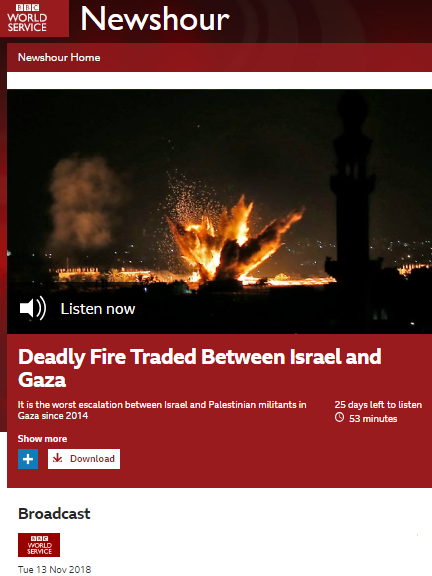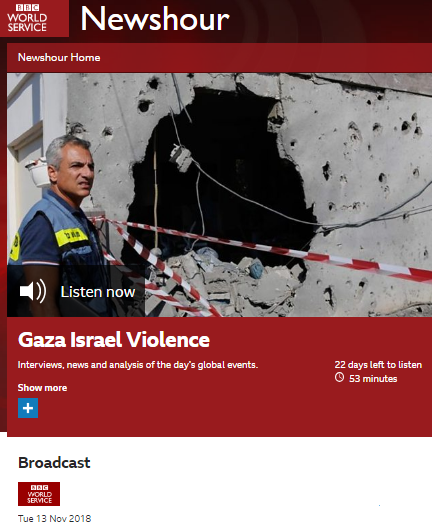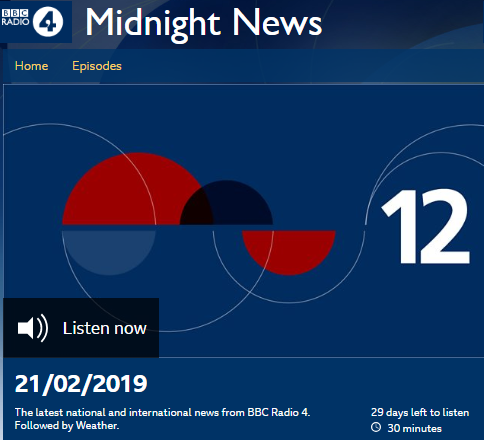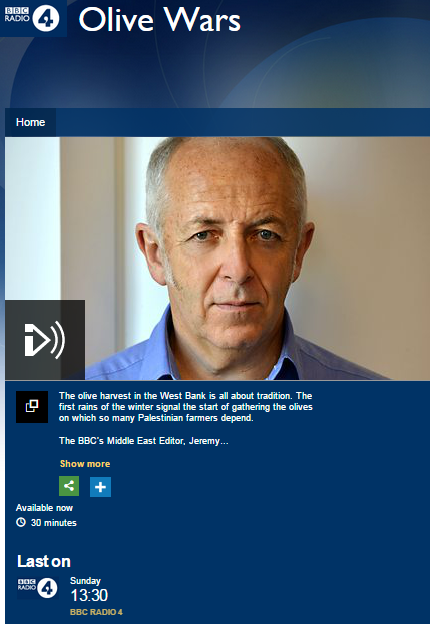In part one of this post we saw that listeners to the two editions of the BBC World Service radio’s flagship news and current affairs programme ‘Newshour‘ on November 12th were repeatedly led to believe that just one of the seven Palestinians killed in the incident near Khan Younis the previous evening was a member of Hamas despite the fact that all belonged to terror factions.
By the time those two editions had ended, listeners had heard from two residents of the Gaza Strip – one at length – but nothing from any of the residents of southern Israel affected by the 17 rocket attacks launched by terrorists on November 11th or the hundreds of attacks launched from the afternoon of November 12th onward.
On the following day (November 13th) the afternoon edition of ‘Newshour’ was titled “Deadly Fire Traded Between Israel and Gaza” and once again the image used to illustrate the programme’s webpage depicted a scene in the Gaza Strip.
“The worst escalation between Israel and Palestinian militants in Gaza since the 2014 war is threatening to descend into a full-blown conflict. More than 400 rockets have been fired into Israel, while Israeli aircraft have hit 150 militant targets in response.”
(Photo: Smoke blows up [sic] after Israeli fighter jets carried out airstrike to positions in Gaza City. Credit: Getty Images)
As documented here previously, presenter Julian Marshall failed to tell listeners that by that time at least three of those killed in IDF strikes had been claimed as members by terror organisations. This edition did however include the first – and only – mention of the fact that a civilian had been killed when a rocket hit an apartment block in Ashkelon.
Marshall: “Well Israeli airstrikes have left at least six Palestinians dead.”
The item included a brief statement from an IDF Spokesperson as well as an interview with a resident of the Gaza Strip (Majd Masharawi) and a resident of Ashkelon (Sigal Arieli).
Listeners did not hear anything which would contribute to their appreciation of the fact that in this round of violence, Israeli civilians were being deliberately targeted by terrorist organisations while civilians in the Gaza Strip were actually receiving warnings of impending strikes against military targets in order to ensure their safety.
The evening edition of the programme was titled “Gaza Israel Violence” and for the first time visitors to the webpage saw an image depicting events in Israel.
“Hamas says it’s agreed to a ceasefire in its hostilities with Israel. Israel says it reserves the right to strike inside Gaza. But how to stop the violence for good? We’ll hear from a former senior member of the Obama White House.”
(Photo: Buildings in the southern Israeli town of Ashkelon were hit by rockets fired from Gaza. Credit: AFP)
As noted here previously, the original caption to that photograph uses the word ‘house’ rather than “buildings”.
Presenter Tim Franks introduced the item (from 00:52 here), once again erasing the fact that all the Palestinians killed in the incident near Khan Younis were members of terror factions.
Franks: “It takes two sides to agree a ceasefire. The question tonight in the Middle East is is that what Israel and Hamas – the Palestinian group running Gaza – have both agreed? Hamas says it has; that it said yes to the terms of an Egyptian brokered deal. Israeli officials have been rather more circumspect, saying they reserve the right to continue air strikes into Gaza as necessary. All this comes against the most heated flare-up of violence between Israel and Palestinian militants for four years. Over the weekend Israeli Special Forces conducted an operation deep inside Gazan territory which appeared to spin out of control. Seven Palestinians were killed including a senior Hamas commander. One Israeli officer died. Out of Gaza there then came a barrage of hundreds of rockets fired into southern Israel. The Israeli military conducted scores of airstrikes inside Gaza. There was widespread fear that this could escalate into a full-blown war as it has three times in the last decade. “
Listeners then heard a report from Jerusalem correspondent Yolande Knell in which they were told that:
Knell: “The Israeli military says more than 460 rockets and mortars were fired from Gaza in the past 24 hours and that it struck 160 militant targets including a building in Gaza City that it said was used by Hamas intelligence.”
Knell then immediately contradicted that accurate information with a claim from a Gaza resident who later on in the week cropped up in yet another BBC report.
Knell: “A doctor living there, Adnan al Waheidi, condemned the attack.”
Al Waheidi: “They destroy a civilian building which was fully occupied with families, where you find women are crying and the children are leaving and everybody’s just trying to escape for themself.”
Although by the time this programme was aired the extent of the damage to homes and businesses in southern Israeli communities was clear and the death of one civilian and injury of dozens of others had been amply reported by the local media, Knell confined her portrayal of the Israeli side of the story to sirens.
Knell: “On the Israeli side sirens sounded repeatedly. Einav Shimoni lives just two miles from the Gaza border.”
After listeners had heard Shimomi’s description of alarms and running to the shelter, Knell told ‘Newshour’ listeners for the first time in all four programmes that the seven Palestinians killed in the incident near Khan Younis were “militants”.
The item continued with segments from the interviews with Majd Masharawi in Gaza and Sigal Arieli in Ashkelon which had been heard in that day’s earlier edition of ‘Newshour’ and closed with an interview about ceasefire prospects with Ilan Goldenberg – described by Franks as “a man who used to be one of President Obama’s point men on the Middle East”.
In the four editions of ‘Newshour’ aired on November 12th and 13th BBC World Service listeners around the world heard one short statement from an IDF spokesperson and one lengthy interview with a Hamas spokesman – parts of which were later repeated. Listeners heard comment relating to the broader background to the story from one Israeli journalist and one American commentator as well as one Israeli MK. Interviews with four different residents of the Gaza Strip – two of them lengthy and one partly repeated – were aired in contrast to interviews with two Israeli civilians affected by the rocket attacks – one lengthy and partly repeated.
BBC editorial guidelines on impartiality state that their principles include:
“We must do all we can to ensure that ‘controversial subjects’ are treated with due impartiality in all our output.
News in whatever form must be treated with due impartiality, giving due weight to events, opinion and main strands of argument.
We are committed to reflecting a wide range of opinion across our output as a whole and over an appropriate timeframe so that no significant strand of thought is knowingly unreflected or under-represented.”
And:
“News in whatever form must be treated with due impartiality, giving due weight to events, opinion and main strands of argument. The approach and tone of news stories must always reflect our editorial values, including our commitment to impartiality.”
“Due impartiality” and “due weight” can hardly be said to have been achieved when listeners heard twice as many voices from the Gaza Strip than they did Israeli civilians.
Listeners heard inaccurate descriptions of the Palestinians killed in the incident near Khan Younis on five occasions (and on one webpage) and only one accurate portrayal. They heard one accurate and one inaccurate portrayal of people in the Gaza Strip killed in the Israeli airstrikes that came in response to Gaza terror factions’ missile fire on civilians. A civilian killed in Ashkelon in one of those rocket attacks was mentioned just once.
Half of the programmes failed to clarify to listeners that while the rocket fire by Gaza based terror groups deliberately targeted Israeli civilians, Israel’s airstrikes targeted the assets of terror factions and false equivalence between those differently focused attacks was promoted in all editions.
The BBC’s editorial guidelines on accuracy state that its principles include:
“We must do all we can to ensure due accuracy in all our output.
The BBC must not knowingly and materially mislead its audiences. We should not distort known facts, present invented material as fact or otherwise undermine our audiences’ trust in our content.”
Repeatedly describing six of the seven people killed in the incident near Khan Younis as “Palestinians” even though – as locally based BBC journalists knew – they had been claimed by two armed terror factions is obviously a prime example of misleading audiences and distorting known facts.
Related Articles:
Reviewing BBC WS ‘Newshour’ coverage of events in Israel and Gaza – part one
Terrorists and rockets disappear in BBC news reports
More BBC false equivalence on World Service radio – part one
More BBC false equivalence on World Service radio – part two
False equivalence in BBC News report on Gaza rocket attacks




